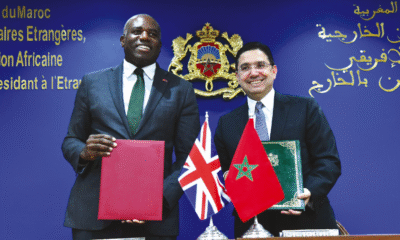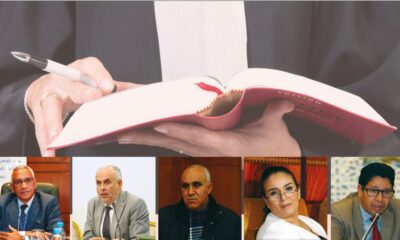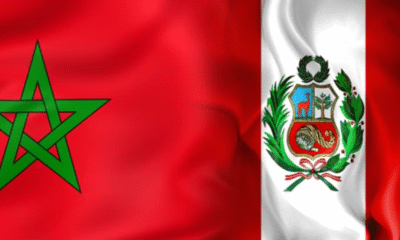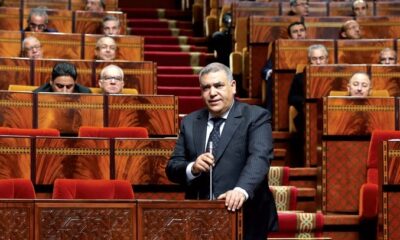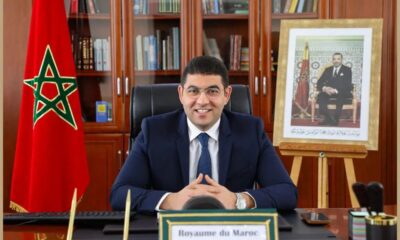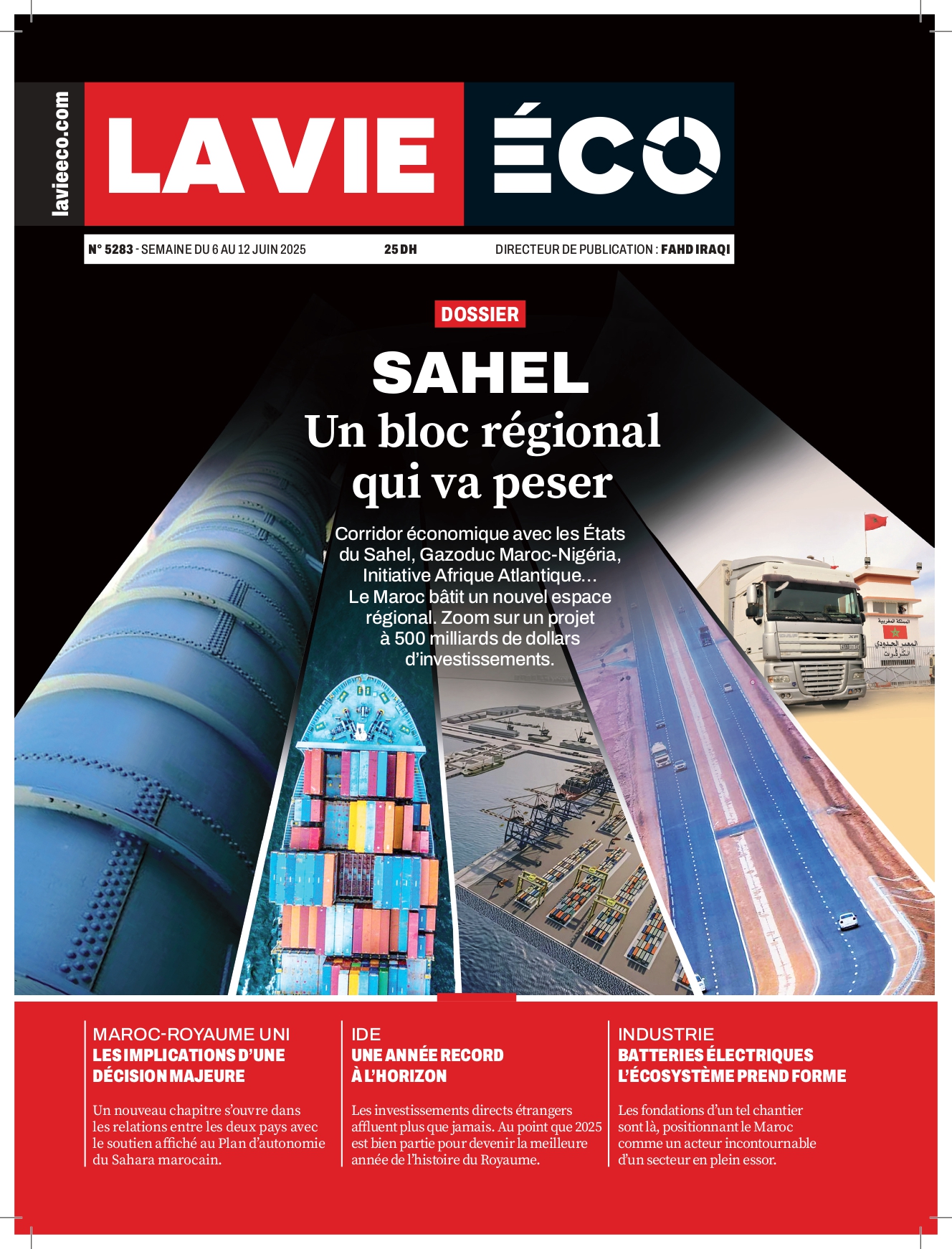Business
Amal El Fallah Seghrouchni: «Making Morocco a Major Digital Player »
Government initiatives, support and financing measures, overhaul of the legal framework, digital infrastructures… The digital lady of the Akhannouch government reveals to us the Executive’s approach to strengthening the start-up ecosystem.

The Moroccan government is deploying a coherent set of measures aimed at creating a competitive, sustainable national start-up ecosystem resolutely oriented towards the international stage. Beyond financial and structural support, particular attention is given to adapting the legal and regulatory framework, considered a fundamental lever to support this dynamic that seeks to ensure territorial equity. Amal El Fallah Seghrouchni, Minister Delegate in charge of Digital Transition and Administrative Reform, details her department’s roadmap. Round-Up.
What are the main initiatives planned by your department to strengthen the start-up ecosystem in Morocco?
In accordance with the enlightened vision of His Majesty King Mohammed VI, the Ministry of Digital Transition and Administrative Reform (MTNRA) is deploying a series of ambitious initiatives to consolidate the start-up ecosystem.
Objective: to make Morocco a major digital player at the continental and international level, placing young innovative companies at the heart of the economic dynamic. The ministry has launched a national digital development strategy where start-ups occupy an important position.
They are seen as essential engines of innovation, competitiveness, and job creation. This strategy provides for the implementation of an integrated «Startup Policy», a financing continuum from ideation to growth phase, as well as a series of incentive levers to encourage entrepreneurship.
Among the flagship measures is the creation of a «Life Grant », an interesting mechanism that allows project leaders to leave salaried employment while benefiting from personal financial support to fully devote themselves to creating their company. This initiative aims to reduce barriers to entrepreneurial action.
What about support and financing structures?
The ministry plans to strengthen support structures through targeted subsidies. Incubators and accelerators will receive technical support, while start-ups will have access to enhanced accompaniment, as evidenced by the example of Technopark with its regional impact.
Furthermore, a subsidy mechanism is envisaged to facilitate access for young innovative companies to financing in the form of loans, depending on their development stage. On the venture capital front, the «Venture Capital » offer has been launched to support quality national start-up fund managers while attracting international investors to invest in Moroccan or Morocco-linked young companies with a productive base.
In parallel, efforts will be made to spread a true start-up culture, strengthen the attractiveness of the entrepreneur status, and firmly anchor innovation in the national economic fabric.
Specifically, what are the avenues to revise and improve the current legal framework to better support start-ups and facilitate their growth?
Our «Startup Policy» is designed to offer a clear legislative environment, favorable to innovation and adapted to the specificities of young tech companies. This policy notably aims to frame and structure start-up support, while clarifying their status and strengthening their access to support mechanisms. In this logic, a Startup Label is being implemented.
It will make it easier to identify companies eligible for tax incentives, support programs, and financing opportunities, while enhancing their visibility to national and international investors.
Among other key regulatory measures is the revision of the foreign exchange ceiling applicable to the import of digital services. This will now be adjusted according to the digital maturity level of start-ups, allowing them easier access to essential international technological services for their development.
The strategy also provides for the establishment of profit-sharing schemes for employees and partners of start-ups, aiming to retain talent and encourage risk-taking within high-growth companies.
How can public procurement promote the development of start-ups?
While the 2013 decree constituted an initial framework for public procurement, the 2023 reform marks a turning point by explicitly integrating the notions of innovative purchasing, spontaneous offers, and competitive dialogue.
These new mechanisms open access to public markets for start-ups and tech SMEs by creating a more flexible and experimentation-friendly framework. The implementation of these provisions will be progressively clarified in close consultation with the relevant public actors to ensure appropriation and effectiveness.
Moreover, several innovative initiatives are being deployed to strengthen synergies between administrations and start-ups. Pilot projects have already been launched to experiment with co-creation laboratories for technological solutions.
These laboratories will allow public administrations and Moroccan start-ups to collaborate from the design phase to develop tailor-made solutions rooted in the real needs of users and territories. This approach aims to make public procurement a full-fledged innovation lever, serving the modernization of public action and the strengthening of the national digital ecosystem.
What initiatives are planned to facilitate access to financing for young entrepreneurs?
Financing is one of the major challenges faced by start-ups, especially at the early stage of their development. This observation guides our strategy, which relies on a financing continuum covering the entire life cycle of young innovative companies.
This vision is embodied through two complementary axes: the Venture Capital (VC) axis and the Venture Building (VB) axis. The Venture Capital program is part of a protocol agreement with the Mohammed VI Investment Fund, the Deposit and Management Fund, and the Ministry of Economy and Finance.
A risk coverage mechanism deployed by the MTNRA is planned to further encourage investment in Moroccan start-ups. The call for expressions of interest launched on this occasion generated strong enthusiasm: 47 applications were received, including 33 from international management companies.
Within this framework, the ministry will mobilize up to 500 million dirhams to stimulate the development of a local start-up ecosystem with international ambition. Particular attention will be paid to so-called «early stage» financing (pre-seed, seed, and pre-series A) to ensure a solid and sustainable deal flow, the cornerstone of a performing venture capital ecosystem.
And for the Venture Building program?
This program is deployed under a framework agreement signed on September 30, 2024. It is based on the creation of the Digital Startup Fund, a fund dedicated to financing start-ups and structuring a national incubation and acceleration ecosystem.
This offer stands out by an integrated approach, combining personalized support and non-dilutive financing adapted to the different stages of entrepreneurial development. The call for expressions of interest launched on October 9, 2024, to select operators for this program resulted in 32 applications from nationals and internationals.
The evaluation process is currently underway with preselected operators. The objective is to co-construct support programs, with operational deployment planned in the coming months. One of the major specificities of the VB offer lies in its non-dilutive financing component, offering start-ups support without capital loss. It includes four main instruments.
First, the Life Grant, intended to support high-potential employees wishing to embark on entrepreneurship by offering financial support to cover their personal expenses at the start of their project. Then, the Incubation Grant, which finances the development of innovative products and their market launch.
The third instrument is the «Honor Loan», an interest-free and guarantee-free financing, repayable only in case of project success, intended to strengthen the structuring and maturity of start-ups before fundraising. Finally, the « Seed Loan », designed to support start-ups in the acceleration phase, either in anticipation of fundraising or as a complement to already obtained financing.
Morocco aims to become a technological hub in Africa. How then to attract foreign investors and talents?
The MTNRA relies on an active presence at major international digital events while organizing or supporting reference events on national territory. Roadshows are thus organized in Morocco and abroad to connect Moroccan start-ups to international technological ecosystems, strengthen their visibility, and increase their fundraising opportunities.
The ministry sponsors and supports start-ups’ participation in major events such as Web Summit (Lisbon), Gitex Global (Dubai), LEAP (Saudi Arabia), and Gitex Africa (Morocco). Through official stands or supervised delegations, these companies can present their solutions before a global audience of investors, experts, and decision-makers.
The ministry also commits to facilitating their integration into international innovation programs and promoting Moroccan success stories globally. Moreover, Morocco is an engaged player in major international technological coalitions.
As a founding member and elected member of the executive committee of the DCO (Digital Cooperation Organization), the Kingdom benefits from a strategic coordination space to expand commercial outlets for Moroccan start-ups, harmonize digital policies, and promote cross-investments among member countries.
These alliances are essential to create sustainable bridges between Moroccan start-ups and emerging or mature markets while strengthening their credibility with international investors.
What are the government’s priorities to improve the country’s digital infrastructures?
The Moroccan government has made strengthening digital infrastructures a strategic priority. Objective: to create a robust technological foundation to support the Kingdom’s digital transformation and enable the emergence of new economic models.
The first intervention axis concerns strengthening national connectivity. The ministry continues the massive deployment of fiber optics, with particular attention to reducing the digital divide between urban and rural areas.
In parallel, preparatory work for the adoption of 5G is underway to anticipate new industrial and economic uses made possible by this technology. The government is also investing in modernizing data centers and developing a sovereign cloud to guarantee security, sovereignty, and data accessibility, especially for administrations and strategic companies.
What about artificial intelligence and blockchain?
Technologically, artificial intelligence is established as a transversal lever in the digital strategy. It irrigates both the digital transformation of public administration and the dynamization of the digital economy.
The government wishes to fully exploit AI’s potential to automate and improve public services while supporting innovation in the private sector. Particular attention is paid to structuring the AI ecosystem in Morocco by supporting research, skills development, and the creation of adapted local solutions.
Similarly, blockchain is recognized for its assets in transparency, traceability, and securing exchanges. It is notably seen as a strategic tool in finance (digital payments, fintech), administrative services, and logistics.
The cryptocurrency regulatory bill, led by Bank Al-Maghrib and currently in the legislative process, marks a key step towards progressive regulation of these rapidly expanding technologies. This regulation is essential because cryptocurrencies rely on blockchain technology to record and validate their transactions.
What measures have been taken to strengthen digital skills in Morocco?
The Kingdom is multiplying initiatives to strengthen digital know-how and encourage technological entrepreneurship among young people. These efforts are part of a strategic will to support the country’s digital transformation while enhancing its human capital.
One of the first emblematic initiatives in this area is YouCode, a coding school launched in 2020, aiming to democratize access to digital training. Primarily intended for young people without diplomas, it offers free training in web and mobile development.
Since its creation, the school has already trained more than 2,000 young people, offering them real professional prospects in a constantly evolving market. Another flagship program: JobinTech, officially launched nationally on May 30, 2024, thanks to an agreement signed between the Ministry of Digital Transition and several public and private partners.
This program aims to train 14,000 talents in three years through upskilling or reskilling pathways in digital professions. The pilot phase, deployed between 2023 and 2024, shows encouraging results: 984 young people qualified, 10 training operators mobilized, and an insertion rate exceeding 70%, nearly half with permanent contracts.
It is also noted that 5% of beneficiaries chose to resume their studies, a sign of renewed confidence. More recently, in March 2025, the ministry announced the launch of the National Program for Training in Digital and Artificial Intelligence Skills, in partnership with several key institutions, including Mohammed VI Polytechnic University.
This unprecedented program targets children and adolescents and aims to introduce them from an early age to digital tools through practical workshops focused on artificial intelligence, programming, and responsible digital use. By betting on an inclusive approach, the program aims to reach all regions of the Kingdom and to awaken early vocations in promising technological fields.
Beyond major cities like Casablanca and Rabat, what efforts are being made for start-up development in other regions of Morocco?
Aware of the importance of balanced territorial coverage, the ministry is actively committed to ensuring equitable regional coverage of digital transformation efforts, from north to south and east to west of the country.
One of the major levers of this policy is direct support for local initiatives. Any regional initiative led by public, private, or academic actors expressing a need for support benefits from assistance from MTNRA services to promote the emergence of innovative projects rooted in their territory.
This support notably takes the form of partnerships, logistical support, technical advice, or targeted funding.
Is this done through the Technoparks deployed across the Kingdom?
Indeed, the ministry has strengthened the means of Technopark, a central actor in territorial innovation, to support it in deploying its new roadmap where regionalization is established as a strategic pillar.
Thanks to this support, the expansion of Technoparks is accelerating: after Casablanca, Rabat, Tangier, and Agadir, several new sites have been opened or are under development in Essaouira, Fès, Oujda, Tiznit, Marrakech, and Khémisset, with the ambition to cover at least seven regions and ten cities by 2026.
This expansion is based on an offer structured around five axes: territorial proximity, adapted support, access to modern infrastructures, targeted training programs, and connection to national and international innovation networks. Each Technopark adopts a personalized approach, taking into account the economic specificities and strategic sectors of the implantation region.
Objective: to create dynamic regional ecosystems capable of absorbing, developing, and showcasing high-potential local start-ups. Territorial equity is also at the heart of actions carried out in the field of digital training.
Whether in national education, higher education, or professional training and career transition, the MTNRA ensures that young people from all regions can access quality training.

